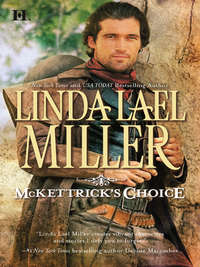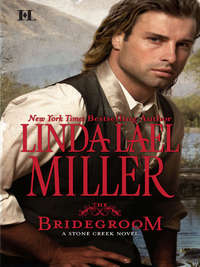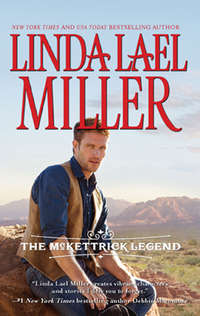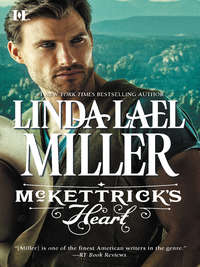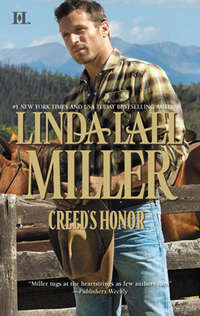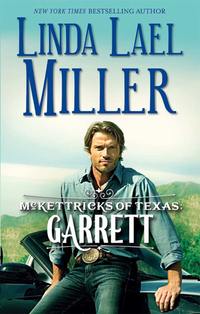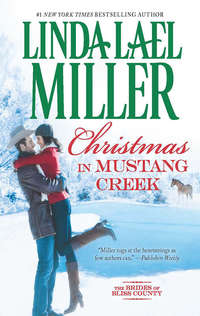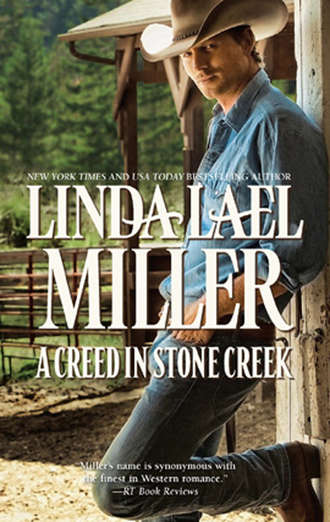
Полная версия
A Creed in Stone Creek
“He rented that space next door to the dry cleaners,” J.P. went on. “He’s a lawyer, you know. He’ll be hanging out a shingle any day now, I’m told.”
“Stone Creek could use a good attorney,” Melissa said, largely uninterested. Was this the reason J.P. had asked for a Friday morning meeting—because he wanted to shoot the breeze about Steven Creed? “Since Lou Spencer retired, folks have had to have their legal work done in Flagstaff or Indian Rock.”
J.P. took a loud sip from his coffee cup. “I hear Mr. Creed plans on working pro bono,” he added. “Championing the downtrodden, and all that.”
That caught Melissa’s full attention. Stone Creek wasn’t exactly a hotbed of litigation, but it had its share of potential plaintiffs as well as defendants, that was for sure. There were disputes over property lines and water rights, Sheriff Parker hauled in the occasional drunk driver, and some of the kids in town seemed to gravitate toward trouble.
“That’s interesting,” Melissa said, vaguely unsettled as some pertinent recollection niggled at the back of her brain, just out of reach. As for Mr. Creed, well, she tended to be suspicious of do-gooders—they usually had hidden agendas, in her experience—but she was also intrigued. Even a little pleased to learn that Steven Creed wasn’t just passing through town on his way to somewhere more fashionable, like Scottsdale or Sedona.
She remembered the child, his ebony hair a gleaming contrast to Creed’s light-caramel locks. “The boy must take after his mother,” she mused.
“Boy?” J.P. echoed, sounding puzzled. Then a light seemed to go on inside his head. “Oh, yes, the boy,” he said, shifting around on his chair. “His name’s Matthew. He’s five years old, and he’s adopted.”
Melissa blinked, a little taken aback by the extent of his knowledge until she recalled that J.P.’s youngest daughter, Elaine, had moved back to Stone Creek after a divorce two years before, and opened a private, year-round preschool called Creekside Academy.
Of course. Creed must have enrolled the child in advance—and Elaine had passed the juicy details on to her father.
J.P. finished up with a flourish. “And there’s no Mrs. Creed, either,” he said.
According to Elaine—she and Melissa had gone through school together—from the day she’d jettisoned the loser husband and returned to the old hometown to make a fresh start, her dad had been after her to “get out more, meet people, kick up your heels a little… As if Stone Creek were overrun with single men,” Elaine had grumbled, the last time Melissa had run into her, a few days before, over at the drugstore.
Melissa, who hadn’t had a date in over a year herself, had sympathized. Between her sisters, Ashley and Olivia, and her big brother, Brad, somebody was always after her to go on out there and find True Love. Easy for them to say. Brad had Meg. Olivia had Tanner. And Ashley had Jack. The unspoken question seemed to be, So what’s your problem, Melissa? When are you going to get with the program and corral yourself a husband?
Melissa frowned.
J.P. either missed the expression or ignored it. Rising to his feet, he lobbed his empty coffee cup into the circular file with the grace of a much younger man. Back in the day, during high school and college, Judge Carpenter had been a basketball star, but in the end, he’d chosen to pursue a career in the law. “Well,” he said cheerfully, “I hereby declare this meeting over.”
“That was a meeting?” Melissa asked, arching one eyebrow. The subtext was: I wolfed down the one turkey- sausage biscuit I allow myself per week just so you could tell me Steven Creed is single?
“Yes,” J.P. said. “Now, I think I’ll go fishing.”
Melissa laughed and shook her head.
J.P. had just left when Sheriff Tom Parker peeked in from the doorway. Tom was a hometown boy, a tall, lean man with dark hair and, usually, a serious look on his face.
“Hey,” he said.
“Hey.” Melissa smiled. She and Tom were old friends. Nothing more than that, though—he was attractive, in a rustic sort of way, if shy, and he’d been divorced from his high school sweetheart, Shirleen, for years. Everybody in Stone Creek knew he’d fallen head over heels for Tessa Quinn the day she opened the Sunflower Bakery and Café—everybody, that is, except Tessa.
“Just wanted to remind you that Byron Cahill gets out of jail today,” Tom said, looking spiffy in his summer uniform of brown khaki.
Melissa felt a mild shiver trip down her spine. Two years ago, when Cahill was still a teenager, he’d gotten high one Saturday afternoon, compounded the problem with copious amounts of alcohol, swiped his mother’s car keys and gone on a joyride. The joy was short-lived, as it turned out, and so was fifteen-year-old Chavonne Rowan, who was riding shotgun.
When the “borrowed” car blew a tire on a sharp curve outside of town, it shot through a guardrail, plunged down a steep cliff into Stone Creek, teetered on its nose, according to witnesses, and went under. Two fishermen had rescued Byron; he came out of the wreck with a few cuts and bruises and a really bad attitude. Chavonne, it turned out, had died on impact.
Byron was arrested as he left the hospital in Flagstaff, where he’d been taken by ambulance, as a precaution. Although uninjured, he’d been admitted for a week of detox.
Melissa had successfully petitioned the Court to have young Cahill tried as an adult, over his mother’s frantic protests that he was a good boy, just a little high-spirited, that was all, and then Melissa had thrown the proverbial book at him.
It was a slam dunk. Byron was convicted of second-degree manslaughter and dispatched to a correctional facility near Phoenix to serve his sentence—just over eighteen months, as it turned out.
Velda Cahill, his mother, who cleaned motel rooms and served cocktails to make ends meet, rarely missed a chance to corner Melissa and tell her about all the things poor Byron was missing out on, all because she, Melissa, “a high-and-mighty O’Ballivan,” had wanted to show off. Let everybody know that the new county prosecutor was nobody to mess with.
Melissa felt sorry for Velda. Never reminded her that Chavonne Rowan was missing out on plenty—the rest of her life—and so were her devastated parents.
Tom Parker knotted one hand into a loose fist and tapped his knuckles against the framework of the door to get Melissa’s attention, bring her back to the present moment.
“You be careful now,” he said. “If Cahill so much as looks cross-eyed at you, call me. Right away.”
Melissa blinked a couple of times, dredged up a smile. “You don’t think he’d come back to Stone Creek, do you?” she asked. “It’s not as if the town would throw a parade to welcome him home, you know.”
Tom tried to smile back, but the light didn’t spark in his eyes. “I think Cahill’s the type to move back in with his mother and mooch for as long as she’ll let him. And you know Velda—she won’t turn her baby boy out into the cold, cruel world.” He paused, rapped at the door-frame again, for emphasis. “Be careful,” he repeated.
“I will,” Melissa said. She wasn’t afraid of Byron Cahill or anybody else.
Tom hesitated. “And speaking of parades—”
Melissa, who had turned her attention to a file by then, looked up. She was getting a headache.
“That was a figure of speech, Tom,” she said patiently.
“We’ve got Stone Creek Rodeo Days coming up next month,” Tom persisted. “And Aunt Ona had to resign from the Parade Committee because of gallbladder problems. She’s been heading it up for thirty years, you know. Since you and I were just babies.”
Melissa saw it coming then. Yes, sir, the light at the end of the tunnel was actually a train. And it was bearing down on her, fast.
“Listen, Tom,” she said earnestly, leaning forward and folding her hands on her desktop. “I’m a good citizen, an elected official. I vote in every election. I pay my taxes. On top of all that, I fulfill my civic duty by keeping the town—and the county—safe for democracy. Believe me when I tell you, I feel as much sympathy for Ona and her gallbladder as anyone else does.” She paused, sucked in a deep breath. “But that doesn’t mean I’m going to join the Parade Committee.”
Tom blushed a little. “Actually,” he said, after clearing his throat, “we were hoping you’d take over, sort of spearhead the thing.”
Again, Melissa thought of her siblings.
Olivia, a veterinarian and a regular Dr. Doolittle to boot, apparently able to converse with critters of all species, through some weird form of telepathy, oversaw the operation of the local state-of-the-art animal shelter, and directed the corresponding foundation.
Ashley, too, was almost continually involved in one fundraising event or another—and their brother, Brad? He was a country-music superstar, even though he’d technically retired around the time he and Meg McKettrick got married. His specialty was writing whopping checks for pretty much any worthy cause—and doing the occasional benefit performance.
“You have the wrong O’Ballivan,” she told Tom, feeling like a slacker. They were overachievers, her sibs, with a tendency to make her look bad. “Talk to Olivia—or Ashley. Better yet, have Brad buy you a parade.”
Tom grinned faintly and then gave his head a sad little shake. “Olivia’s too busy,” he said. “Ashley is out of town. And Brad has his hands full running Stone Creek Ranch—”
“No,” Melissa broke in, to stop the flow. “Really. I wouldn’t be any good at organizing a parade. I’ve watched a lot of them, on TV and right here in Stone Creek. I’ve seen Miracle on 34th Street four million times. But that’s the whole scope of my experience—I wouldn’t know the first thing about putting something like that together.”
The sheriff colored up a little, under the jaw and around his ears. “You think Aunt Ona was an expert on parades, back when she took over? No, ma’am. She just pushed up her sleeves and plunged right in. Learned on the job.”
“There must be someone else who could do this,” Melissa said weakly.
But Tom shook his head again, harder this time. “We got the Food Concession Committee, and the Arts and Crafts Show Committee, and the committee to deal with the carnival folks. Everybody’s either already volunteering, doing something else or out of town.”
Melissa set her jaw. By then, she was starting to feel downright guilty, but that didn’t mean she was going to give in.
Out front, Andrea chirped a sunny greeting to someone. Melissa felt an odd little zip in the air, like the charge before a summer thunderstorm.
“Then I guess you’ll have to cancel the parade this year,” Melissa said.
And that was when the little boy she’d seen at the café that morning, eating pancakes at the counter, popped into her office.
He looked up at Tom, then over at Melissa, his dark violet eyes troubled. His lower lip began to wobble.
“There isn’t going to be a parade?” he asked.
CHAPTER TWO
QUICKLY—BUT NOT QUITE quickly enough, as it turned out—Steven pursued Matt through the open doorway, scooped him up from behind and immediately locked eyeballs with the certifiably hot woman he’d checked out while he and the boy were having breakfast earlier that morning, over at the café.
When their glances connected, his-meets-hers, there was an actual impact, it seemed to Steven. He half expected things to explode all over the place, walls to tumble, ceilings to collapse, founts of fire to shoot up out of the floor, as in some apocalyptic action movie.
Damn, he thought, dazed by the strength of his reaction. He’d known plenty of beautiful women in his time, none of whom had ever affected him in just this way. Was it the amazing body, the face, the crazy mane of thick brown hair, falling past her shoulders in spiral curls, the jarringly blue eyes that seemed to see past all his defenses?
Who knew? He glanced down at the nameplate on her desk.
Melissa O’Ballivan. Prosecutor.
Uh-oh, he thought. Been there, done that.
After what Cindy Ryan had done to him, he’d sworn off dating other lawyers—especially DAs and their assistants.
“Sorry,” Steven said, finally finding his voice and dredging up the patented, lopsided grin that had been serving Creed men well for generations. “We stopped by to pay a parking ticket, and Matt here got away from me.”
It was only then that he noticed the uniformed lawman standing just inside the small room, arms folded, assessing him with a certain noncommittal detachment, as if he might be running through a mental database of wanted criminals, in case he could match up Steven’s face to one of them. Here was a man who took his job seriously.
Maybe he’d been the one to write that ticket and place it neatly under the windshield wiper of Steven’s old truck.
Either way, Steven liked him right off, and figured that liking would stick. His first impressions of people were usually, though not always, accurate ones.
“County Clerk’s office is just down the hall,” the cop said, relaxing visibly. “You can settle up on the ticket there.” That said, he put out his hand in that quintessentially small-town way Steven knew so well. “Tom Parker,” he said.
“Steven Creed,” Steven replied, setting a squirmy Matt on his own two feet.
“How come there isn’t going to be a parade?” Matt piped up. He wheeled to look up at Steven. “You said there would be a parade. And a rodeo, too. That’s the main reason I didn’t run away from home when you told me we were moving here!”
By that time, the spectacularly sexy Ms. O’Ballivan had pushed back her chair and stood, soon rounding the desk to face the boy. There was no telling what she thought of Steven, if he’d even registered on her radar, but the lady had obviously fallen for Matt, hook, line and sinker.
“Hi,” she said, with a smile that tugged at Steven’s gut like a fishhook, even though she was looking down at the child, not at him. “My name is Melissa O’Ballivan. What’s yours?”
“Matt Creed,” the boy responded, somewhat warily because he’d been taught to be careful of strangers, and Steven felt another tug, this time at his emotions. He’d given Matt the choice, when the adoption became final, of keeping his folks’ last name—St. John—or taking on his new father’s. And it still touched him that Matt, who remembered Zack and Jillie with a clarity Steven did everything he could to maintain, had decided to go by Creed.
“Matt,” Steven managed, clearing his throat. He still had that weird feeling going on inside and he wanted to get away, so he could mull it over, come to terms, make some sort of sense of it.
Whatever “it” was.
“Let’s go take care of that parking ticket,” he prompted, after an entirely rhetorical glance at his watch, failing completely to note the time. “We’re due to sign the papers for the ranch in a few minutes.”
“You said there would be a parade,” Matt repeated, turning away from the dazzle of Melissa O’Ballivan to frown up at Steven. The kid could be bone-stubborn when he’d made up his mind about something, which meant the Creed name would suit him just fine.
The lawman, Parker, cleared his throat. Slanted a glance at Ms. O’Ballivan. “Aunt Ona already did most of the work,” he told her. “Laid the groundwork, signed off on the different floats and even arranged for all the permits. Only thing you’d have to do is oversee a couple of meetings, check stuff off on a clipboard. Make sure folks live up to their commitments.”
Melissa laid a hand on top of Matt’s head and ruffled his dark hair slightly. Her shoulders rose and fell as she drew in a big breath and sighed it out, looking cheerfully doomed. “Welcome to Stone Creek, Matt Creed,” she said. “And here’s hoping you’ll enjoy the parade.”
Mollified, Matt punched the air with one small fist and turned to Steven. “Yes!” he said, with a grin.
By then, Steven had pieced the scenario together in his mind, or part of it, at least. Ms. O’Ballivan hadn’t wanted to oversee the upcoming event, but she’d been roped in anyhow—by the sheriff, from the sound of it.
Steven allowed himself a long look at Melissa—an indulgence, considering the way she shook him up. The Realtor who’d sold him the Emerson ranch had touted both the parade and the rodeo as “longstanding community traditions,” in addition to other selling points, and Steven had made a big deal about the festivities so Matt would have something to look forward to, besides the relatively immediate dog and the eventual pony.
“Thanks,” Steven told Melissa, and the word came out sounding gruff.
She made a comical face. “Don’t mention it,” she replied, rueful.
“Maybe I could help out somehow,” Steven heard himself say, as he took Matt’s hand and started to turn away. “Not that I know much about parades.”
“Join the club,” Melissa said, with another of those lethal smiles of hers.
Steven grinned, nodded and managed to peel himself away.
He forgot all about paying the parking ticket, though, because his mind was full of Melissa O’Ballivan, and it was bound to stay that way.
All through the closing, held in a meeting room over at the Cattleman’s Bank, Matt fidgeted. Steven signed papers, handed over a cashier’s check covering the cost of the property in full, probably came across as a man who knew what he was doing.
Adopting a little boy. Quitting the prestigious Denver firm where he’d worked since he’d left the family business. Winding up so far from the Creed ranch outside Lonesome Bend, Colorado, which had been in the family for well over a hundred years, only to buy a run-down spread in another state.
Was he a man who knew what he was doing? Before he’d encountered Ms. O’Ballivan, Steven would have answered with an unqualified “yes.” Now, he wasn’t so sure.
“WHAT JUST HAPPENED HERE?” Melissa asked, widening her eyes at Tom Parker and laying the splayed fingers of one hand to her chest. Steven Creed and his little boy, Matt, had probably been gone for all of thirty seconds, but it seemed as if they’d taken all the oxygen in the room away with them, leaving a vacuum.
Tom chuckled. “Stone Creek has itself a new chairman for the Parade Committee,” he said, looking pleased and maybe a little smug on top of that. Then, about to leave, he paused in the doorway to wink at her. “And unless I miss my guess, the earth just moved.” With that, he was gone.
Melissa stood in the middle of the office floor for a few moments, flustered. Then, because she was nothing if not professional, she walked over, gave her door a firm shove with one palm to shut it and marched back to her desk.
She didn’t have many cases to prosecute; things had been pretty quiet around Stone Creek since Byron Cahill got himself sent up, but there were a few, and she always had reports to make, files to review, emails to read and respond to. If she’d been smart, she thought to herself, she’d have gone fishing with J.P.
At midmorning, Andrea rapped on the office door and stuck her head in to say that she needed to go home because she had cramps and there was nothing to do around that place anyway.
Peering at the girl over the tops of her reading glasses, Melissa mouthed the word go and logged on to her computer. Andrea might or might not have been suffering from cramps, but there was no arguing with the fact that both of them were, for today at least, underworked.
Melissa, grateful to be putting in eight-hour days, like normal people, didn’t miss the high stress levels and double workweeks of her previous jobs. She liked having the time to paint the rooms of her little house evenings and weekends, read stacks of books, enjoy her growing gaggle of nieces and nephews and even garden a little.
Okay, so she’d been through a romantic—not to mention sexual—dry spell since her breakup with Dan Guthrie, several long and eventful years before. Nobody had everything, did they?
Something sagged inside Melissa when she asked herself that question. Her sisters had everything a person could reasonably want, it seemed to her—babies, hunky husbands who adored them, work they loved—and it went without saying that Brad had caught the brass ring. During his amazing career, he’d collected more than a dozen awards from the Country Music Association, along with a few Grammys for good measure, his marriage to Meg McKettrick was beyond happy, and they were building a beautiful family together.
Melissa sighed. Time to put away the tiny violin, stop comparing herself to her brother and sisters. Sure, she was a little lonely from time to time, but so what? She was healthy. She had kin, people who loved her. Stone Creek Ranch, with its long and colorful history, was still home. She had a fine education, no mortgage, a jazzy car custom-built to look just like a 1954 MG Roadster, and enough money socked away to retire at forty if she wanted to.
Which she probably wouldn’t, but that wasn’t the point, was it?
For Melissa, success meant having options. It meant freedom.
If she had a notion to pull up stakes and throw herself body and soul into a job in a more exciting place—say, L.A. or New York—she could do that. There was nothing to tie her down: she could simply resign from her present position, rent out her house or even sell it, say another goodbye to Stone Creek and boogie.
She loved her sisters and her brother. She had lots of friends, people she’d known all her life. But it was the idea of leaving her nieces and nephews, not being there, in person, to see them grow up but instead settling for digital photos, phone calls, rare visits and emails that made a hard knot form in her throat.
And why was she even thinking these thoughts, anyway? Because Tom had been right, that was why.
Steven Creed and his little boy had appeared in her office and, at some point, the earth had moved. Shifted right off its axis. Gravity was suspended. Up was down and down was up, and the proof of that could be stated in one short, simple sentence: She’d agreed to head the Parade Committee.
Melissa drew in a breath, huffed it out hard enough to make her bangs flutter, and scanned the list of new messages on her computer screen.
Tom Parker, sitting three doors down at his own keyboard, IMed her to say that time was wasting and she really ought to schedule a meeting so she could get on the same page with everybody on the Parade Committee.
The response she sent was not something one would normally say to a police officer, face-to-face or via email. But this was Tom, the guy she’d grown up with, the man who’d named his dog Elvis, for Pete’s sake.
Tom replied with a smiley-face icon wearing big sunglasses and displaying a raised middle finger.
Melissa laughed at that—she couldn’t help it—and went back to the official stuff.
Eustace Blake, who was ninety if he was a day and nonetheless managed to navigate the public computer over at the library just fine, thank you very much, had hunted-and-pecked his way through a complaint he’d made many times before, with subtle variations. Visitors from some faraway planet had landed in his cornfield—again—and scared his chickens so badly that the hens wouldn’t lay eggs anymore, and for all he knew, they’d contaminated his stretch of the creek, too, and by God he wanted something done about it.
Smiling to herself, wishing mightily for a fresh cup of coffee, Melissa wrote back, politely inquiring as to whether or not Eustace had reported the most recent incident to Sheriff Parker. Because, she assured the old man, he was absolutely right. Something had to be done. She even included Tom’s cell number.
The next half-dozen messages were advertisements—find love, get rich quick, clear up her skin, enlarge her penis. She deleted those.
Then there was the one from Velda Cahill—Melissa would have known that email address anywhere, since she’d practically been barraged with communiqués since Byron’s arrest. This time, the subject line was in caps. FROM A TAX PAYING CITIZEN, it read.
Melissa sighed. For a moment, her finger hovered over the delete key, but in the end, she couldn’t make herself do that. Velda might be a crank—make that a royal pain in the posterior—but she was a citizen and a taxpayer. As such, she had the inalienable right to harangue public officials, up to a point. She’d written:


